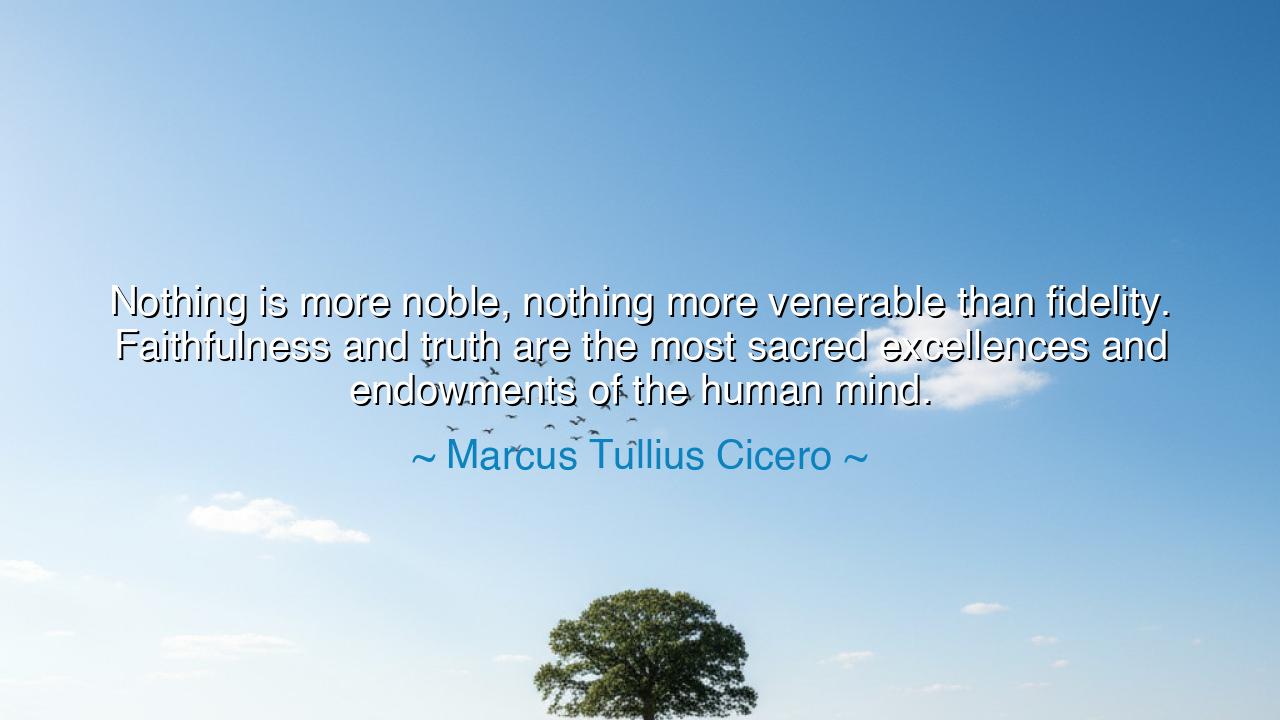
Nothing is more noble, nothing more venerable than fidelity.
Nothing is more noble, nothing more venerable than fidelity. Faithfulness and truth are the most sacred excellences and endowments of the human mind.






“Nothing is more noble, nothing more venerable than fidelity. Faithfulness and truth are the most sacred excellences and endowments of the human mind.” Thus spoke Marcus Tullius Cicero, the Roman orator, philosopher, and guardian of the Republic. In this pronouncement, he raises fidelity and truth above wealth, power, or glory. For what is nobility without faithfulness? What is greatness without truth? Cicero, who lived in an age of betrayal and civil strife, understood that a society cannot stand when these sacred virtues are abandoned, and a man cannot be truly great without them.
The ancients revered fidelity as the bond that held both families and nations together. To be faithful was to stand unshaken through storms, to be constant in friendship, to honor one’s word even when it cut deep. Cicero himself, though a man of immense eloquence and influence, valued not the shifting winds of flattery or deceit, but the steadfastness of character. He saw that truth is the compass of the mind, and faithfulness the anchor of the heart. Without them, no human endeavor—be it love, politics, or philosophy—can endure.
History offers us the shining example of Regulus, the Roman general captured by Carthage during the Punic Wars. The Carthaginians sent him back to Rome to argue for peace, under oath that he would return if unsuccessful. Regulus stood before the Senate, not pleading for his own life, but urging his country to continue the fight. True to his oath, he returned to Carthage, where death awaited him. His story is the embodiment of Cicero’s teaching: that fidelity to one’s word, even unto death, is more venerable than survival itself.
But history also offers darker lessons. The fall of Julius Caesar came not at the hands of foreign enemies, but of those closest to him—men who had dined at his table, professed loyalty, and yet betrayed him in the Senate chamber. That single act of treachery shattered the Republic beyond repair. Cicero himself, who lived through those bloody years, knew well the destructive power of faithlessness. His words are not merely philosophy, but a warning: when truth and fidelity are lost, all that is noble decays into ruin.
Cicero’s wisdom also reaches beyond politics into the realm of daily life. In friendship, what greater gift is there than faithfulness? In love, what treasure surpasses truth? Power and beauty fade, but the bond of constancy endures. To know that one can depend upon another, to know that words spoken are words kept—this is the essence of trust, the foundation upon which families, friendships, and nations are built. Truly, these are the “sacred excellences” of the human mind.
Children of tomorrow, take this lesson to heart: seek not honor in riches or fleeting praise, but in the constancy of your character. Be faithful to your promises, for your word is the measure of your soul. Speak the truth, even when it costs you, for falsehood may shine for a moment but truth endures forever. Remember Cicero’s wisdom: fidelity and truth are not ornaments of the virtuous—they are the very core of what it means to be human.
Let your practice be this: when you pledge, fulfill; when you love, be steadfast; when you speak, speak truthfully. Guard your fidelity as a soldier guards his shield, for once it is broken, all is lost. Live so that your life becomes a testimony that faithfulness and truth are indeed the noblest treasures of the human spirit. For in them lies honor, in them lies greatness, and in them lies the immortality of a name remembered with reverence through the ages.






ADLe Anh Dung
The reverence Cicero has for fidelity is striking, but it raises the question of whether faithfulness can sometimes become burdensome. Can truth and loyalty coexist with the complexities of human nature and the shifting dynamics of life? How do we define true loyalty in an era when everything seems in constant flux? Is the pursuit of fidelity more about maintaining integrity or about adhering to a set of unchanging principles?
LQLe Quyen
Cicero presents fidelity as the ultimate excellence, yet I wonder if that is always true. Is there such a thing as too much faithfulness, especially in relationships that may no longer serve us well? How do we know when to remain loyal and when to let go for the sake of personal growth or well-being? Can truth and faithfulness coexist with the need for change and flexibility in our lives?
Ssakurachan
Cicero’s statement about fidelity being the most sacred virtue makes me question whether loyalty can sometimes be a weakness. When we are overly committed to something or someone, does it ever cloud our judgment or prevent growth? How do we navigate situations where being faithful might hold us back from progress or understanding other perspectives? Can loyalty coexist with the need to adapt in a rapidly changing world?
NBLE NHAT BANG
I find this quote powerful because it positions fidelity as something sacred and unmatched in nobility. However, does fidelity ever conflict with other virtues, like compassion or understanding? Is it possible for someone to be overly faithful or truthful to a fault, especially in situations where flexibility might be more appropriate? How do we balance faithfulness to others with the need to stay true to ourselves, especially when circumstances change?
VNVanthu Nguyen
The way Cicero elevates fidelity to the highest level of virtue is thought-provoking. In modern times, can we still view faithfulness and truth as the ultimate goals, or are they becoming less relevant in a fast-paced, ever-changing world? How can we ensure that our commitment to truth doesn’t turn into rigidity or dogma? Do these qualities still hold the same significance in our personal lives and in society?